#poverty
Text
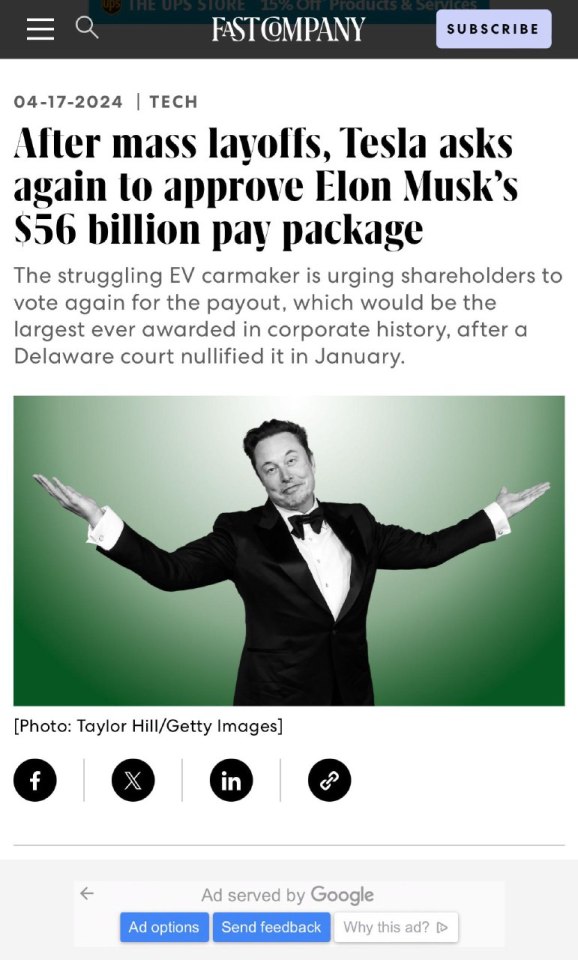
More than half the country can’t afford housing and then we have this POS
#anti elon musk#elon musk#elongated muskrat#elon twitter#elongated man#fuck elon#bailout#jerktrillionaires#jerkbillionaires#jerkmillionaires#teslamodely#teslamotors#teslacars#tesla#delaware#government corruption#usa news#usa#america#twitter#x#spacex#space x#elon mask#elon musty#elonmusk#homeless#poverty#eat the rich#eat the fucking rich
17 notes
·
View notes
Text
Ian Millhiser at Vox:
The Supreme Court will hear a case later this month that could make life drastically worse for homeless Americans. It also challenges one of the most foundational principles of American criminal law — the rule that someone may not be charged with a crime simply because of who they are.
Six years ago, a federal appeals court held that the Constitution “bars a city from prosecuting people criminally for sleeping outside on public property when those people have no home or other shelter to go to.” Under the United States Court of Appeals for the Ninth Circuit’s decision in Martin v. Boise, people without permanent shelter could no longer be arrested simply because they are homeless, at least in the nine western states presided over by the Ninth Circuit.
As my colleague Rachel Cohen wrote about a year ago, “much of the fight about how to address homelessness today is, at this point, a fight about Martin.” Dozens of court cases have cited this decision, including federal courts in Virginia, Ohio, Missouri, Florida, Texas, and New York — none of which are in the Ninth Circuit.
Some of the decisions applying Martin have led very prominent Democrats, and institutions led by Democrats, to call upon the Supreme Court to intervene. Both the city of San Francisco and California Gov. Gavin Newsom, for example, filed briefs in that Court complaining about a fairly recent decision that, the city’s brief claims, prevents it from clearing out encampments that “present often-intractable health, safety, and welfare challenges for both the City and the public at large.”
On April 22, the justices will hear oral arguments in City of Grants Pass v. Johnson, one of the many decisions applying Martin — and, at least according to many of its critics, expanding that decision.
Martin arose out of the Supreme Court’s decision in Robinson v. California (1962), which struck down a California law making it a crime to “be addicted to the use of narcotics.” Likening this law to one making “it a criminal offense for a person to be mentally ill, or a leper, or to be afflicted with a venereal disease,” the Court held that the law may not criminalize someone’s “status” as a person with addiction and must instead target some kind of criminal “act.”
Thus, a state may punish “a person for the use of narcotics, for their purchase, sale or possession, or for antisocial or disorderly behavior resulting from their administration.” But, absent any evidence that a suspect actually used illegal drugs within the state of California, the state could not punish someone simply for existing while addicted to a drug.
The Grants Pass case does not involve an explicit ban on existing while homeless, but the Ninth Circuit determined that the city of Grants Pass, Oregon, imposed such tight restrictions on anyone attempting to sleep outdoors that it amounted to an effective ban on being homeless within city limits.
There are very strong arguments that the Ninth Circuit’s Grants Pass decision went too far. As the Biden administration says in its brief to the justices, the Ninth Circuit’s opinion did not adequately distinguish between people facing “involuntary” homelessness and individuals who may have viable housing options. This error likely violates a federal civil procedure rule, which governs when multiple parties with similar legal claims can join together in the same lawsuit.
But the city, somewhat bizarrely, does not raise this error with the Supreme Court. Instead, the city spends the bulk of its brief challenging one of Robinson’s fundamental assumptions: that the Constitution’s ban on “cruel and unusual punishments” limits the government’s ability to “determine what conduct should be a crime.” So the Supreme Court could use this case as a vehicle to overrule Robinson.
That outcome is unlikely, but it would be catastrophic for civil liberties. If the law can criminalize status, rather than only acts, that would mean someone could be arrested for having a disease. A rich community might ban people who do not have a high enough income or net worth from entering it. A state could prohibit anyone with a felony conviction from entering its borders, even if that individual has already served their sentence. It could even potentially target thought crimes.
Imagine, for example, that an individual is suspected of being sexually attracted to children but has never acted on such urges. A state could potentially subject this individual to an intrusive police investigation of their own thoughts, based on the mere suspicion that they are a pedophile.
A more likely outcome, however, is that the Court will drastically roll back Martin or even repudiate it altogether. The Court has long warned that the judiciary is ill suited to solve many problems arising out of poverty. And the current slate of justices is more conservative than any Court since the 1930s.
[...]
The biggest problem with the Ninth Circuit’s decision, briefly explained
The Ninth Circuit determined that people are protected by Robinson only if they are “involuntarily homeless,” a term it defined to describe people who “do not ‘have access to adequate temporary shelter, whether because they have the means to pay for it or because it is realistically available to them for free.’” But, how, exactly, are Grants Pass police supposed to determine whether an individual they find wrapping themselves in a blanket on a park bench is “involuntarily homeless”?
For that matter, what exactly does the word “involuntarily” mean in this context? If a gay teenager runs away from home because his conservative religious parents abuse him and force him to attend conversion therapy sessions, is this teenager’s homelessness voluntary or involuntary? What about a woman who flees her violent husband? Or a person who is unable to keep a job after they become addicted to opioids that were originally prescribed to treat their medical condition?
Suppose that a homeless person could stay at a nearby shelter, but they refuse because another shelter resident violently assaulted them when they stayed there in the past? Or because a laptop that they need to find and keep work was stolen there? What if a mother is allowed to stay at a nearby shelter, but she must abandon her children to do so? What if she must abandon a beloved pet?
The point is that there is no clear line between voluntary and involuntary actions, and each of these questions would have to be litigated to determine whether Robinson applied to an individual’s very specific case. But that’s not what the Ninth Circuit did. Instead, it ruled that Grants Pass cannot enforce its ordinances against “involuntarily homeless” people as a class without doing the difficult work of determining who belongs to this class.
That’s not allowed. While the Federal Rules of Civil Procedure sometimes allow a court to provide relief to a class of individuals, courts may only do so when “there are questions of law or fact common to the class,” and when resolving the claims of a few members of the class would also resolve the entire group’s claims.
The Grants Pass v. Johnson case at SCOTUS could make life worse for unhoused Americans.
#Unhoused People#Homelessness#Grants Pass v. Johnson#SCOTUS#Crime#Martin v. Boise#9th Circuit Court#8th Amendment#Poverty#Grants Pass Oregon
19 notes
·
View notes
Text
yall have got to be more normal about Southern people and I'm not kidding. enough of the Sweet Home Alabama incest jokes, enough of the idea that all Southerners are bigots and rednecks, and enough of the idea that the South has bad food. shut up about "trailer trash" and our accents and our hobbies!
do yall know how fucking nauseating it is to hear people only bring up my state to make jokes about people in poverty and incestuous relationships? how much shame I feel that I wasn't born up north like the Good Queers and Good Leftists with all the Civilised Folk with actual houses instead of small cramped trailers that have paper thin walls that I know won't protect me in a bad enough storm?
do yall know how frustrating it is to be trans in a place that wants to kill you and whenever you bring it up to people they say "well just move out" instead of sympathizing with you or offering help?
do yall understand how alienating it is to see huge masterposts of queer and mental health resources but none of them are in your state because theyre all up north? and nobody seems to want to fix this glaring issue because "they're all hicks anyways"
Southern people deserve better. we deserve to be taken seriously and given a voice in the queer community and the mental health space and leftist talks in general.
#this is kind of a vent honestly but ive been thinking abt it a lot#ask to tag#ok to reblog#southerners#queer#lgbt#neurodivergent#alabama#georgia#tennessee#texas#discourse#?#poverty#southern queer
47K notes
·
View notes
Text
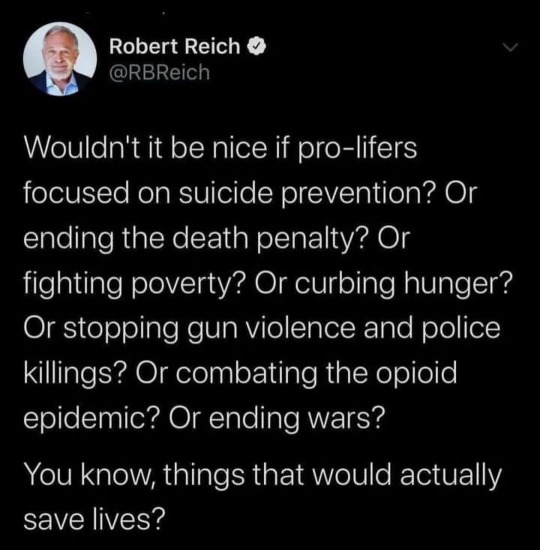
Republicans spread trauma.
24K notes
·
View notes
Text
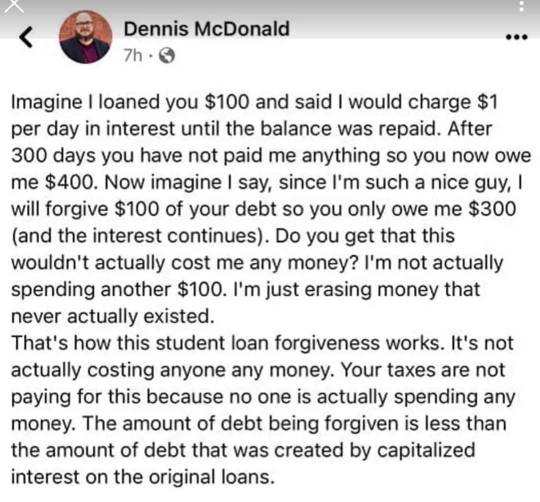
They just want there to always be a class of people who are forever in debt. Whether it's chattel slavery, prison, student loan debt, medical debt, renters who will never be able to own a house, etc.
37K notes
·
View notes
Text
Things Biden and the Democrats did, this week.
The Consumer Financial Protection Bureau put forward a new regulation to limit bank overdraft fees. The CFPB pointed out that the average overdraft fee is $35 even though majority of overdrafts are under $26 and paid back with-in 3 days. The new regulation will push overdraft fees down to as little as $3 and not more than $14, saving the American public collectively 3.5 billion dollars a year.
The Environmental Protection Agency put forward a regulation to fine oil and gas companies for emitting methane. Methane is the second most abundant greenhouse gas, after CO2 and is responsible for 30% of the rise of global temperatures. This represents the first time the federal government has taxed a greenhouse gas. The EPA believes this rule will help reduce methane emissions by 80%
The Energy Department has awarded $104 million in grants to support clean energy projects at federal buildings, including solar panels at the Pentagon. The federal government is the biggest consumer of energy in the nation. The project is part Biden's goal of reducing the federal government's greenhouse gas emissions by 65% by 2030. The Energy Department estimates it'll save taxpayers $29 million in the first year alone and will have the same impact on emissions as taking over 23,000 gas powered cars off the road.
The Education Department has cancelled 5 billion more dollars of student loan debt. This will effect 74,000 more borrowers, this brings the total number of people who've had their student loan debt forgiven under Biden through different programs to 3.7 Million
U.S. Agency for International Development has launched a program to combat lead exposure in developing countries like South Africa and India. Lead kills 1.6 million people every year, more than malaria and AIDS put together.
Congressional Democrats have reached a deal with their Republican counter parts to revive the expanded the Child Tax Credit. The bill will benefit 16 million children in its first year and is expected to lift 400,000 children out of poverty in its first year. The proposed deal also has a housing provision that could see 200,000 new affordable rental units
11K notes
·
View notes
Text
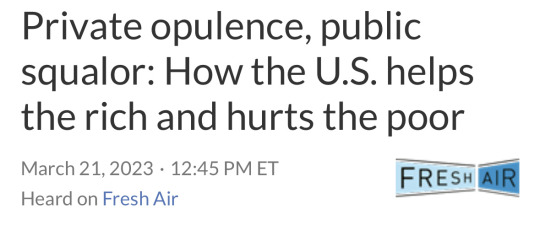
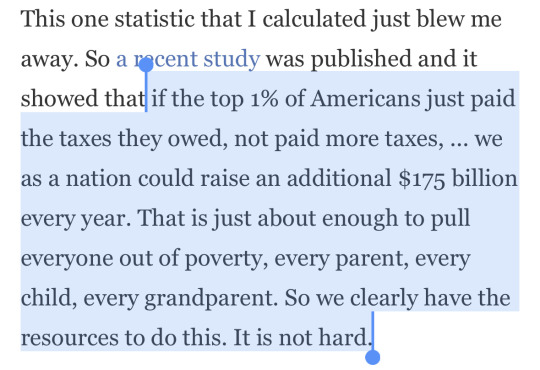
Source
#eat the rich#capitalism#tax the rich#taxes#politics#us politics#income inequality#wealth tax#wealth inequality#socioeconomic inequality#poverty
22K notes
·
View notes
Text
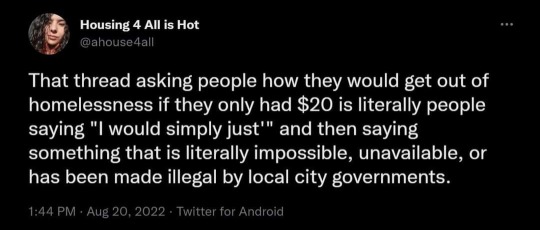
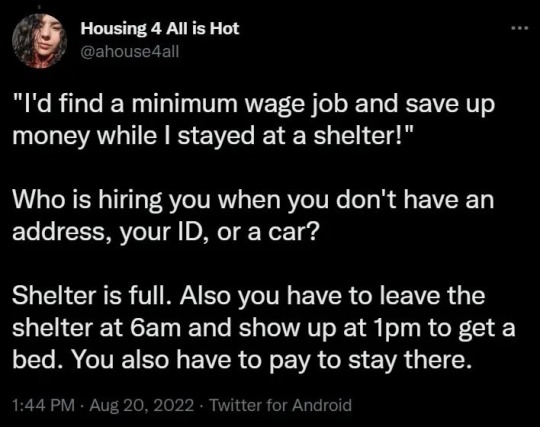

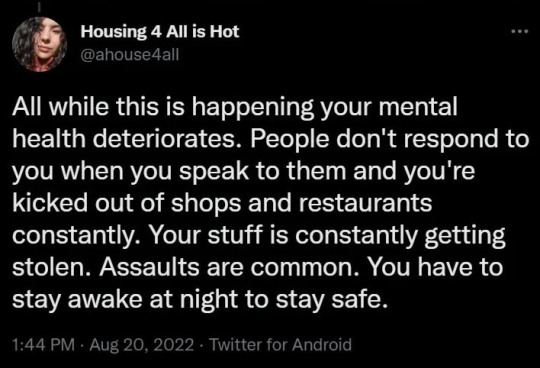
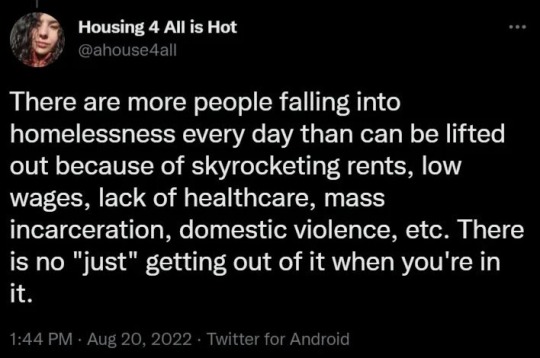
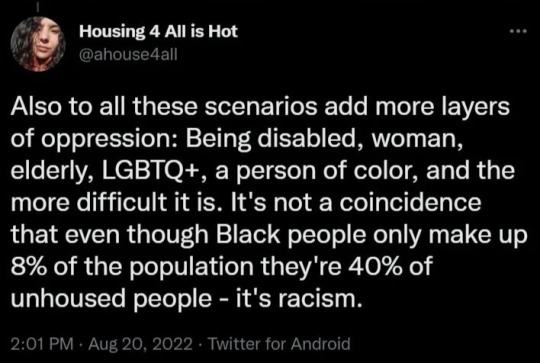
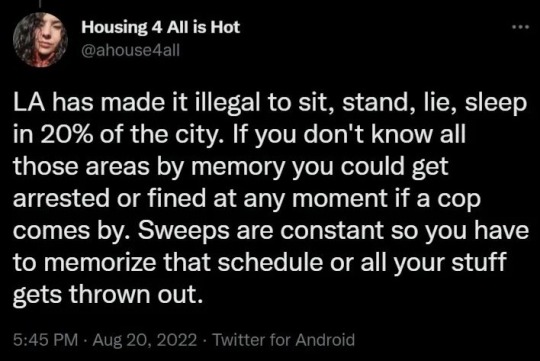
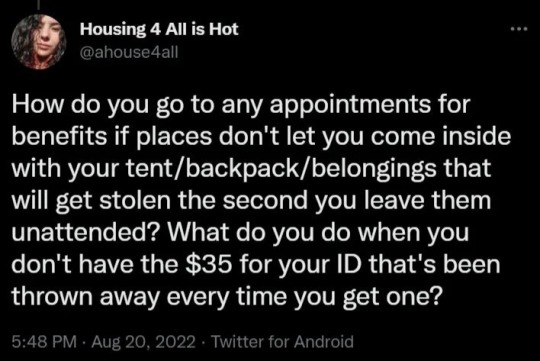

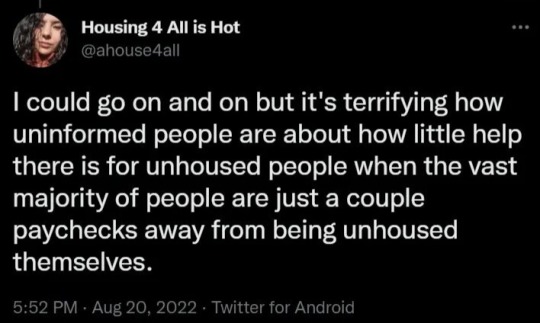
81K notes
·
View notes
Photo
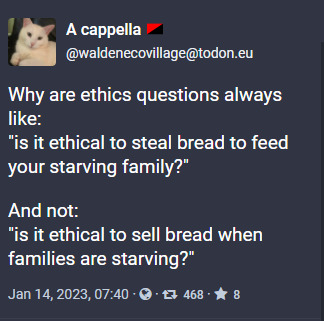
24K notes
·
View notes
Text
being poor is so weird bc you'll see some edgy nyt or vice article or whatever about rural poverty, and it's all the pictures that are supposed to be sad, and they're framed as that, but it's just like. that looks like my buddy's kitchen. that's what my cookout looks like, people standing barefoot in dirt, holding drinks and wearing tore-up clothes. that sad old house is my house with different trees out front. and it's this weird whiplash, you know? like I know I'm poor, it sucks, but I'm generally happy in my life. and then I open some article written by some fucker from the city, taking pictures of barbecues or homes and treating what I experience as happy moments as tragedy. and it's like,,, am I off for being happy, despite the shit circumstances? or are these people so alienated from me that they can't fathom the idea lives like mine have emotional complexity, that I don't look at my house and see the roof falling apart so much as I see my cats waiting inside, a full spice rack in the kitchen, my loved ones laughing at the table. like are people really so far removed that they think we have no joy or love? I think, when I read those articles, they think we're either sad and self-aware, or too dumb to be anything but content, when it's neither. It is fetishistic writing, and I'm sad because I'd love to see poverty discussed in the mainstream but we aren't humanized, or given depth, or asked about anything beyond tragedy. Their sympathy is a farce.
9K notes
·
View notes
Text
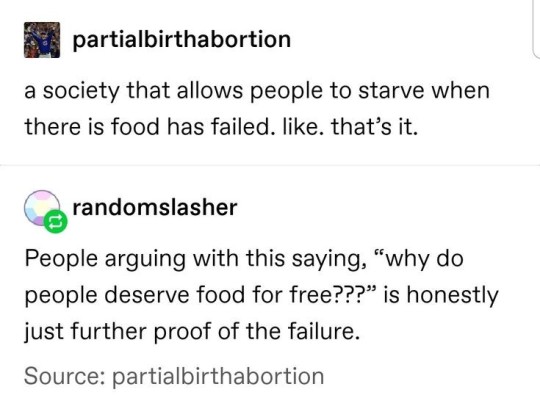
#anarchist#anarchism#anticapitalism#anticapitalist#anarchy#anti capitalism#communism#economic inequality#inequality#equality#end world hunger#world hunger#hunger#poverty#eat the rich
8K notes
·
View notes
Link
So, we now know on a direct statistical level that Dollar General is literally making the Vimes Boots Theory of Economic Unfairness into a part of its core business model.
Sweet jesus...
26K notes
·
View notes
Text
For the first time since 1877, Montrealers without housing may soon be unable to get a hot meal at an Old Montreal soup kitchen.
Fiona Crossling, the general director of Accueil Bonneau, said her organization can no longer afford to serve people on weekends, and she warns that if it can't secure stable provincial government funding, it will have to stop providing meals altogether next month.
"We're operating at a deficit and we just don't have the funds," she said in an interview Tuesday. "We've announced that we will close weekends as of this coming weekend, but we're doing everything we can to negotiate with the government to ensure that it doesn't go any further."
Crossling said her organization, which gives hot meals to around 400 people every morning, has done everything it can to avoid closing its food program. The province gave Accueil Bonneau emergency funding to keep it running through January, but Crossling says her organization has run a deficit for the past three years and can't continue offering food without more help.
Continue Reading
Tagging @politicsofcanada
2K notes
·
View notes
Text
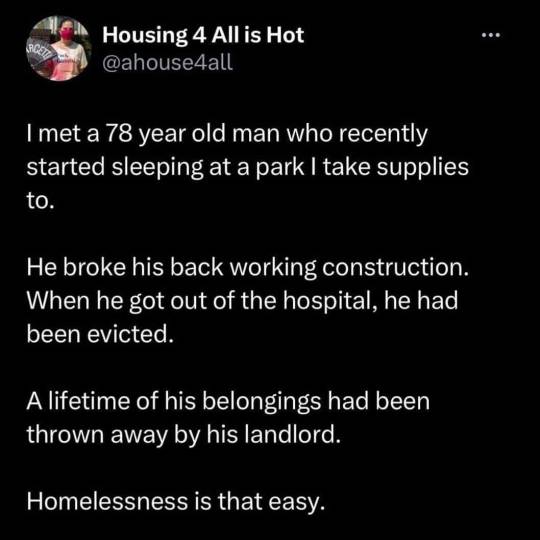
19K notes
·
View notes
Text
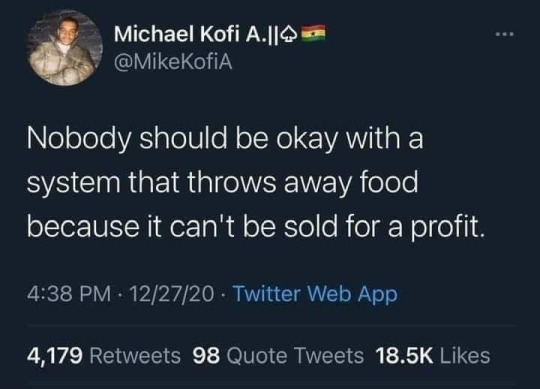
8K notes
·
View notes
Text
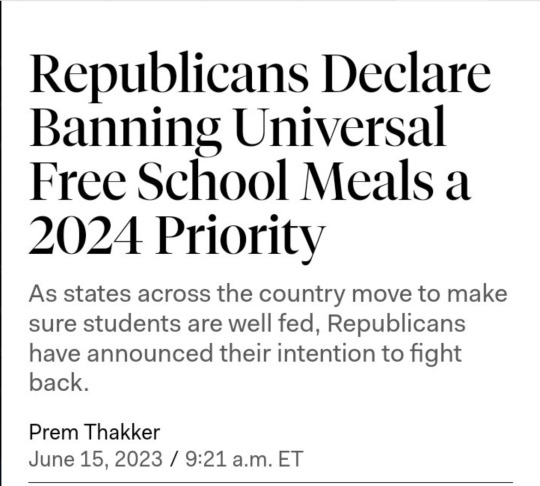
Link
Both Parties are not the same.
23K notes
·
View notes